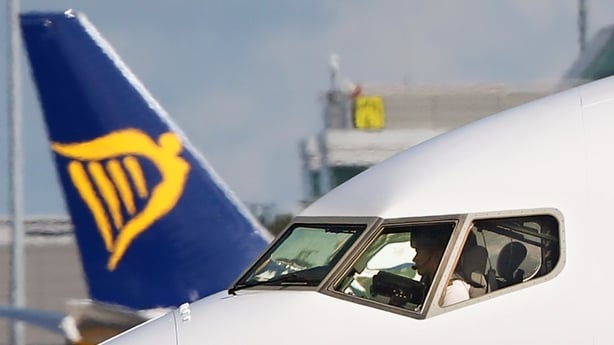Ryanair shares have risen sharply in early trade after the airline said it does not expect leave mismanagement and staff shortages in September to affect its full-year post-tax profit target, which "remains in a range of €1.40 billion to €1.45 billion".
The company's shares are up over 6% in Dublin trade, but are still around 8% below where they were before the first wave of flight cancellation announcements.
The airline today reported an 11% rise in profit after tax to €1.29 billion for the six months to the end of September, while traffic grew 11% to 72.1m when compared with the same period in 2016.
Ryanair shares surge as airline says rostering issues won't affect profit guidance pic.twitter.com/IqReEPUvyv
— RTÉ Business (@RTEbusiness) October 31, 2017
Ryanair said passenger numbers were boosted by a strong Easter and a reduction in air fares, while unit costs (including fuel savings) fell by 5%.
Annual leave mismanagement and staff shortages in September, which triggered the cancellation of over 20,000 flights and more than 700,000 passenger journeys, caused flight punctuality to plummet to 70% in the first half of the month.
€25m was paid in refunds to affected customers in H1, while €45m extra has ben allocated to pay, recruitment, and training for pilots.
The carrier added that "the grounding of 25 aircraft means we will slow H2 growth to approx 4%. As a result, full-year traffic will slow from 131m to 129m customers".

But it has emerged that Ryanair pilots based in Ireland have told the airline they will only negotiate through their new joint European Employee Representative Council (EERC), which the airline has refused to recognise.
Ryanair expects FY18 fares to fall by between 4% and 6%, which is slightly better than previous guidance (-5% to -7%).
CEO Michael O'Leary said the H1 results "reinforce the robust nature of Ryanair’s low fare, pan-European growth model even during a period which suffered a material failure in our pilot rostering function in early September".
However, Mr O'Leary said the airline remains concerned "at the continuing uncertainty surrounding the terms of the UK’s departure from the EU in March 2019.
"There remains a worrying risk of a serious disruption to UK-EU flights in April 2019 unless a timely UK-EU bilateral is agreed in advance of September 2018.
"We, like other airlines, need clarity on this issue before we publish our summer 2019 schedules in mid-2018 and time is running short for the UK to develop a bilateral solution."
He added that any "negative Brexit developments" could impact the airline's full-year post-tax profit guidance.
In an investor note, Davy said Ryanair’s rostering failure "is not without cost – €25m in non-recurring EU261 costs and €45m in FY2018 crew costs (up to €100m in a full year).
"However, management is dealing with this head-on and we believe the winning business model endures – unchanged FY2018 guidance of net profit of €1.4-1.45bn, helped by average fares falling."

